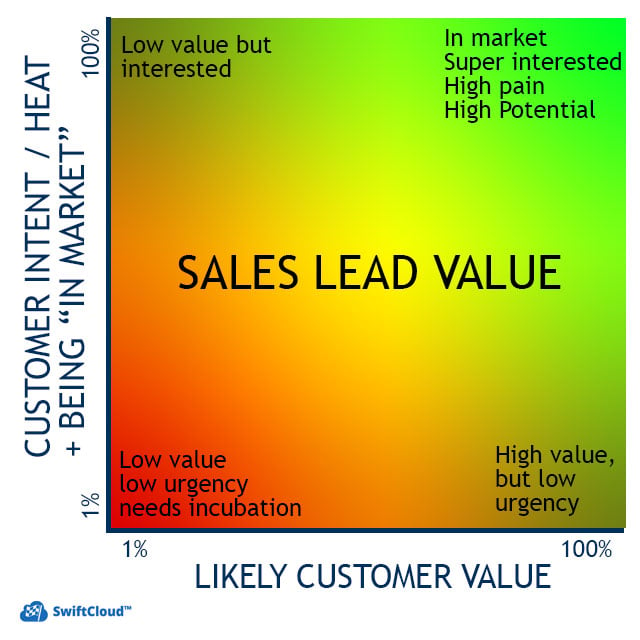Lead generation means actively creating sales leads. More rigorously, it refers to a style of marketing in which the sale is usually made offline, such as buying a car or a house or services.
To truly figure out what does lead generation mean, you need to break down 2 concepts: (1.) Sales Lead Value and (2.) Language / Definitions.

What does lead generation mean?
What you want it to mean is (1.) customer intent (they want to buy what you’re selling), and (2.) the associated contact data, ideally with live hand-off. These are the highest value leads.
What does lead generation mean: Metrics
Customer Intent Scoring (part of Lead Scoring) is based on metrics like
- Are they “in market“? Some things – say, selling money to businesses, the prospects are always “in market”, they always want more money – the problem is more about trust, journey, need, etc. For things like a new car, the client’s completely not in market if they bought one last month. This can and should be scored if it’s relevant.
- How interested are they? How severe is the pain, or desire for the outcome? If you sell business funding, and they need money in 72 hours, that’s a 10 out of 10. If you’re a probate attorney and the person’s loved one hasn’t passed away yet, there’s zero urgency, the prospect is just preparing to be in-market.
- Attention – are they paying attention to your marketing? This can and should be scored as well. Someone who sits through a 50 minute webinar entirely is probably a “hot lead”. Someone who doesn’t even open your emails – doesn’t care – is cold.
- Intent. Do they welcome your call, or think you’re a telemarketer scammer? This is a function of trust & branding. This too can be scored as Brand Trust.
What does lead generation mean: Language
Personally, internally, we use the following structure, which you may find helpful in creating your lead generation plans.
- Suspects. This is raw data, of people (not a company, ideally, but the actual person at a company if you sell b2b) who we believe are a good fit for your product or service. More scientifically, these may not even be “marketing qualified leads” (“MQLs”) yet – it’s just data. Frankly, a lot of people stop here when they talk about selling leads – they’re just selling a list of people based on some criteria.
- Prospects. This is Marketing Qualified cleaned data. As much as practical, the data should be cleaned, segmented, email bounces removed, de-duplicated, do-not call / litigants removed. Ideally, this data about people is then further segmented into time zone if calling.
- Leads. To us, and this is personal definition, not “right” as in globally accepted language, or “right” in the morally correct way – it’s just what we do… anyway, a “lead” means (1.) the person has clearly expressed interest and based on what we know, appears to be a fit for the product / service, and (2.) their accurate contact info. To be more precise, this is called a “Sales Qualified Lead”, and the sales team will usually pick up here if the value warrants it.
So what does lead generation mean, really?
Creation of people who 1. Believe we can solve a problem or help them reach a goal. 2. Welcome our call or call us and ask to be helped. 3. Have some basic brand trust, which is further edified when we speak in person or transact via automated systems. 4. We’re in communication.
In the case of SwiftCloud, us internally, some of software is frankly pretty inexpensive, and thus we’re not going to have sales people chase you. Our marketing should illustrate the value, and if you want the outcome, jump in.
Our sales team, however, will be happy to get involved – and chase you – if our automated systems determine your account is likely worth over a certain threshold – say, 100 seats / licenses for a company, vs. 1 solopreneur.
This is the job of marketing qualification and segmentation, and depending on your business, you’ll want to do this too.
So how can SwiftCloud help?
- Lead Scoring. This is based on what users do, online behavior – example: downloading a whitepaper, watching a video, clicking your newsletter
- Customer Segmentation, which is part of CRM Configuration
- Lead Automated Qualification campaigns. TIP: We have some powerful new code that can “smart redirect” people based on lead-score, so lower-end customers see X, while higher-potential customers see Y.
- Lead Generation systems – compelling message, delivered to the right people, using the 19 traffic systems.
This can be simple or complex – it depends on your needs. The best next step is contact us if you think we can help.
Further reading:

